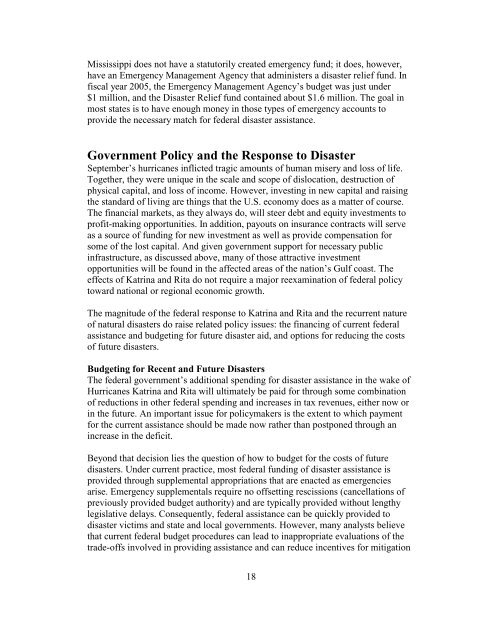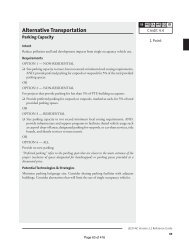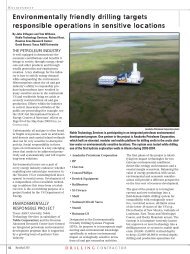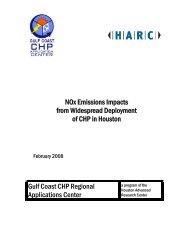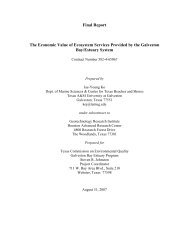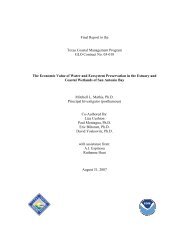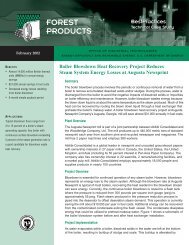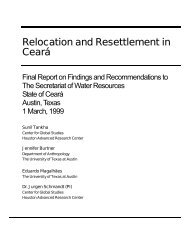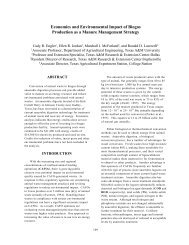Macroeconomic and Budgetary Effects of Hurricanes Katrina and Rita
Macroeconomic and Budgetary Effects of Hurricanes Katrina and Rita
Macroeconomic and Budgetary Effects of Hurricanes Katrina and Rita
Create successful ePaper yourself
Turn your PDF publications into a flip-book with our unique Google optimized e-Paper software.
Mississippi does not have a statutorily created emergency fund; it does, however,<br />
have an Emergency Management Agency that administers a disaster relief fund. In<br />
fiscal year 2005, the Emergency Management Agency’s budget was just under<br />
$1 million, <strong>and</strong> the Disaster Relief fund contained about $1.6 million. The goal in<br />
most states is to have enough money in those types <strong>of</strong> emergency accounts to<br />
provide the necessary match for federal disaster assistance.<br />
Government Policy <strong>and</strong> the Response to Disaster<br />
September’s hurricanes inflicted tragic amounts <strong>of</strong> human misery <strong>and</strong> loss <strong>of</strong> life.<br />
Together, they were unique in the scale <strong>and</strong> scope <strong>of</strong> dislocation, destruction <strong>of</strong><br />
physical capital, <strong>and</strong> loss <strong>of</strong> income. However, investing in new capital <strong>and</strong> raising<br />
the st<strong>and</strong>ard <strong>of</strong> living are things that the U.S. economy does as a matter <strong>of</strong> course.<br />
The financial markets, as they always do, will steer debt <strong>and</strong> equity investments to<br />
pr<strong>of</strong>it-making opportunities. In addition, payouts on insurance contracts will serve<br />
as a source <strong>of</strong> funding for new investment as well as provide compensation for<br />
some <strong>of</strong> the lost capital. And given government support for necessary public<br />
infrastructure, as discussed above, many <strong>of</strong> those attractive investment<br />
opportunities will be found in the affected areas <strong>of</strong> the nation’s Gulf coast. The<br />
effects <strong>of</strong> <strong>Katrina</strong> <strong>and</strong> <strong>Rita</strong> do not require a major reexamination <strong>of</strong> federal policy<br />
toward national or regional economic growth.<br />
The magnitude <strong>of</strong> the federal response to <strong>Katrina</strong> <strong>and</strong> <strong>Rita</strong> <strong>and</strong> the recurrent nature<br />
<strong>of</strong> natural disasters do raise related policy issues: the financing <strong>of</strong> current federal<br />
assistance <strong>and</strong> budgeting for future disaster aid, <strong>and</strong> options for reducing the costs<br />
<strong>of</strong> future disasters.<br />
Budgeting for Recent <strong>and</strong> Future Disasters<br />
The federal government’s additional spending for disaster assistance in the wake <strong>of</strong><br />
<strong>Hurricanes</strong> <strong>Katrina</strong> <strong>and</strong> <strong>Rita</strong> will ultimately be paid for through some combination<br />
<strong>of</strong> reductions in other federal spending <strong>and</strong> increases in tax revenues, either now or<br />
in the future. An important issue for policymakers is the extent to which payment<br />
for the current assistance should be made now rather than postponed through an<br />
increase in the deficit.<br />
Beyond that decision lies the question <strong>of</strong> how to budget for the costs <strong>of</strong> future<br />
disasters. Under current practice, most federal funding <strong>of</strong> disaster assistance is<br />
provided through supplemental appropriations that are enacted as emergencies<br />
arise. Emergency supplementals require no <strong>of</strong>fsetting rescissions (cancellations <strong>of</strong><br />
previously provided budget authority) <strong>and</strong> are typically provided without lengthy<br />
legislative delays. Consequently, federal assistance can be quickly provided to<br />
disaster victims <strong>and</strong> state <strong>and</strong> local governments. However, many analysts believe<br />
that current federal budget procedures can lead to inappropriate evaluations <strong>of</strong> the<br />
trade-<strong>of</strong>fs involved in providing assistance <strong>and</strong> can reduce incentives for mitigation<br />
18


